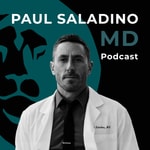The Metabolic Classroom with Dr. Ben Bikman – Details, episodes & analysis
Podcast details
Technical and general information from the podcast's RSS feed.

The Metabolic Classroom with Dr. Ben Bikman
Insulin IQ
Frequency: 1 episode/15d. Total Eps: 112

Hosted on Acast. See acast.com/privacy for more information.
Recent rankings
Latest chart positions across Apple Podcasts and Spotify rankings.
Apple Podcasts
🇨🇦 Canada - nutrition
05/08/2025#3🇨🇦 Canada - healthAndFitness
05/08/2025#71🇬🇧 Great Britain - nutrition
05/08/2025#9🇩🇪 Germany - nutrition
05/08/2025#58🇺🇸 USA - nutrition
05/08/2025#14🇨🇦 Canada - nutrition
04/08/2025#5🇨🇦 Canada - healthAndFitness
04/08/2025#87🇬🇧 Great Britain - nutrition
04/08/2025#6🇩🇪 Germany - nutrition
04/08/2025#46🇺🇸 USA - nutrition
04/08/2025#12
Spotify
No recent rankings available
Shared links between episodes and podcasts
Links found in episode descriptions and other podcasts that share them.
See all- https://www.benbikman.com
97 shares
- https://www.insuliniq.com
67 shares
- https://www.insuliniq.com/
47 shares
- https://youtu.be/1aMuPTre1IU
2 shares
- https://youtu.be/iNmDbApK_FU
2 shares
RSS feed quality and score
Technical evaluation of the podcast's RSS feed quality and structure.
See allScore global : 69%
Publication history
Monthly episode publishing history over the past years.
Why A1C Isn't Enough: Insights from Dr. Ben Bikman with Dr. Ken Berry
Season 2 · Episode 67
lundi 26 août 2024 • Duration 27:57
In this episode of The Metabolic Classroom, Dr. Ken Berry and Dr. Ben Bikman discussed the critical role of endogenous insulin, the limitations of focusing solely on glucose levels, and the implications of common markers like A1C and uric acid in understanding metabolic health.
Dr. Berry began by highlighting how many primary care physicians misunderstand the function of beta cells in type 2 diabetes, often believing that these cells “burn out” and stop producing insulin. Dr. Bikman clarified that in true type 2 diabetes, beta cells do not fail entirely; instead, insulin production often remains high or slightly decreases, which is still significantly higher than normal.
The problem lies in the body’s insulin resistance, not a lack of insulin production. Dr. Bikman emphasized the importance of measuring fasting insulin levels early in a patient's metabolic health journey, noting that levels above 6 microunits/mL can indicate potential problems.
The conversation then shifted to the A1C test, a common marker used to assess blood glucose levels over time. Dr. Berry and Dr. Bikman discussed the limitations of A1C, particularly how it can be falsely elevated or decreased based on the lifespan of red blood cells. Longer-lived red blood cells can cause a falsely high A1C, even if glucose levels are normal, while short-lived red blood cells can lead to a falsely low A1C in the presence of hyperglycemia. Dr. Bikman suggested that while A1C has value, it should not be the sole marker for assessing metabolic health. He also pointed out that A1C does not account for the glycation caused by other sugars like fructose, which can lead to significant damage not reflected in A1C results.
Dr. Berry raised concerns about the carnivore community, where some individuals see their A1C levels rise despite a healthy diet. Dr. Bikman explained that this could be due to longer-lived red blood cells resulting from a nutrient-rich diet. He recommended the fructosamine test as a better indicator of glucose glycation in these cases. The discussion also touched on the lack of tests for fructose and galactose glycation, leaving healthcare providers blind to the potential damage caused by high fructose intake, especially from fruit juices.
The classroom discussion concluded with an exchange about uric acid, particularly its relationship with fructose metabolism. Dr. Bikman shared insights from his research showing that uric acid, which is produced during fructose metabolism, can contribute to insulin resistance and inflammation. However, he also noted that ketones, produced during a ketogenic diet, can inhibit the inflammation caused by uric acid, providing a potential explanation for why individuals on ketogenic diets may experience improved metabolic health despite elevated uric acid levels.
Learn more about Dr. Ken Berry: https://www.drberry.com/about
#InsulinResistance #Type2Diabetes #DrBenBikman #DrKenBerry #A1CTest #FastingInsulin #UricAcid #CarnivoreDiet #Fructose #MetabolicHealth #KetogenicDiet #Inflammation #BetaCells #Endocrinology #BloodGlucose #ProperHumanDiet #HealthLecture #MetabolicClassroom #BiomedicalScience #InsulinIQ
My favorite meal-replacement shake: https://gethlth.com (discount: BEN10)
My favorite electrolytes (and more): https://redmond.life (discount: BEN15)
My favorite allulose source: https://rxsugar.com (discount: BEN20)
Hosted on Acast. See acast.com/privacy for more information.
The Impact of Estrogens on Glucose Metabolism and Insulin Resistance
Season 2 · Episode 66
vendredi 16 août 2024 • Duration 28:45
In this episode of The Metabolic Classroom, Dr. Ben Bikman explores the metabolic effects of estrogens, particularly their role in glucose metabolism.
Estrogens, mainly produced in the gonads, play a crucial role in regulating blood glucose by enhancing insulin sensitivity. Dr. Bikman explained that estrogens improve insulin signaling through pathways such as PI3 kinase and AKT, which are essential for glucose uptake in muscle and fat tissues. Additionally, estrogens activate AMP-activated protein kinase (AMPK), further promoting glucose uptake and maintaining healthy blood glucose levels.
Estrogens also suppress glucose production in the liver by inhibiting key enzymes involved in gluconeogenesis, helping to prevent excess glucose release into the bloodstream. In contrast, progesterone decreases insulin sensitivity and promotes insulin resistance, counteracting some of estrogen's beneficial effects. This hormonal interplay affects glucose metabolism during the ovarian cycle, with estrogen-dominant phases being more favorable for glucose control.
During menopause, the significant drop in estrogen levels leads to increased insulin resistance and shifts in fat storage, often resulting in more central fat accumulation. While hormone replacement therapy (HRT) can mitigate some of these changes, it comes with risks that need careful consideration. Ben emphasizes the significant role of estrogens in glucose metabolism and their broader impact on metabolic health, especially in women.
01:19 - Overview of Estrogens and Progesterone
02:20 - Cholesterol as the Precursor to Sex Hormones
03:34 - The Role of Aromatase in Estrogen Production
04:32 - Understanding the Family of Estrogens
05:56 - Estrogens and Glucose Metabolism: Key Signaling Pathways
06:54 - Insulin Signaling Pathway Overview
08:57 - How Estrogens Enhance Insulin Sensitivity
10:04 - The Role of AMPK in Glucose Uptake
12:11 - Estrogens' Dual Mechanism in Regulating Glucose Levels
13:18 - The Impact of Estrogens on Liver Glucose Production
15:33 - Estrogens' Role in Suppressing Gluconeogenesis
17:07 - Why Women Have Lower Risk of Type 2 Diabetes
19:28 - Metabolic Effects During the Ovarian Cycle
21:54 - Progesterone’s Influence on Insulin Resistance and Fat Storage
25:16 - The Shift in Fat Storage Patterns Post-Menopause
26:16 - Hormone Replacement Therapy: Metabolic Considerations
PI3K activation leads to the phosphorylation of Akt, a key protein in glucose metabolism, which promotes the translocation of GLUT4 (glucose transporter type 4) to the cell membrane, facilitating glucose uptake into muscle and adipose tissue: https://www.sciencedirect.com/science/article/pii/S155041311930138X?via%3Dihub
AMPK acts as an energy sensor and helps maintain cellular energy balance, which is crucial in regulating glucose and lipid metabolism: https://link.springer.com/article/10.1007/s12013-015-0521-z
Progesterone increases blood glucose levels by enhancing hepatic gluconeogenesis. This effect is mediated by the progesterone receptor membrane component 1 (PGRMC1) in the liver, which activates gluconeogenesis pathways, leading to increased glucose production, especially under conditions of insulin resistance: https://www.nature.com/articles/s41598-020-73330-7
Hosted on Acast. See acast.com/privacy for more information.
Exogenous Ketones with Dr. Ben Bikman
Season 2 · Episode 57
jeudi 23 mai 2024 • Duration 30:39
In this episode of The Metabolic Classroom, Dr. Bikman explores the history, science, and benefits of ketones, focusing on exogenous ketones.
Ben highlights the significant benefits of ketones for brain health. He disputes the common belief that glucose is the brain’s preferred fuel, citing research by Dr. George Cahill that indicates the brain relies heavily on ketones during fasting.
The classroom also addresses the evolution and advantages of exogenous ketones. Early forms of exogenous ketones, like ketone salts, had limitations such as mineral imbalance and poor taste. Advances led to the development of ketone esters and bioidentical BHB, which are more effective and palatable. Exogenous ketones can help control appetite, reduce inflammation, and improve exercise performance. Despite initial concerns about their potential to be converted back into fat, Professor Bikman clarifies that this is not a risk, as the liver cannot reverse ketone production into fat.
Overall, Dr. Bikman emphasizes that while ketones themselves offer numerous metabolic benefits, the primary advantage of a ketogenic state is maintaining low insulin levels, which supports fat burning and overall metabolic health. He encourages the use of exogenous ketones to enhance these benefits, particularly for managing cravings, improving physical performance, and supporting cognitive function.
00:01 - Introduction to Ketones
01:58 - Types of Ketones - Explanation of the three main types of ketones: acetoacetate, acetone, and beta-hydroxybutyrate.
02:58 - Ketones and Blood Acidity - Discussion on how ketones can affect blood acidity and the distinction between ketosis and ketoacidosis.
04:04 - Insulin's Role in Ketone Production - How insulin levels determine whether the body produces fat or ketones from acetyl-CoA.
07:23 - Benefits of Low Insulin Levels - Overview of the metabolic benefits of low insulin levels, including improved fat burning and metabolic health.
08:19 - Ketones and Brain Health - The positive effects of ketones on brain function and cognitive health, debunking the myth that glucose is the brain's preferred fuel.
13:33 - Ketones and Physical Performance - Evidence that ketones improve physical performance and energy efficiency in muscle cells.
17:31 - Anti-inflammatory Effects of Ketones - Ketones’ role in inhibiting inflammation and their benefits for inflammatory disorders.
Studies Referenced:
Alzheimer’s and Parkinson’s (Cunnane et al., 2016): https://alzres.biomedcentral.com/articles/10.1186/s13195-021-00783-x
Ketones Elicit Distinct Alterations in Adipose Mitochondrial Bioenergetics: https://pubmed.ncbi.nlm.nih.gov/32872407/
Ketogenic Diet Reduces Midlife Mortality and Improves Memory in Aging Mice: https://pubmed.ncbi.nlm.nih.gov/28877458/
The Effects of Ketogenic Diet on Insulin Sensitivity and Weight Loss, Which Came First: The Chicken or the Egg?: https://pubmed.ncbi.nlm.nih.gov/37513538/
Learn more: https://www.insuliniq.com
Hosted on Acast. See acast.com/privacy for more information.
Heart Health: Fat Matters
Season 2 · Episode 56
lundi 20 mai 2024 • Duration 17:50
In this episode of The Metabolic Classroom, Dr. Ben Bikman challenges the traditional view that saturated fats are the primary cause of atherosclerotic plaques and heart disease. He asserts that while plaques, or atheromas, in coronary arteries are composed partly of fats and foam cells, the exact process of plaque formation remains speculative. Dr. Bikman emphasizes that anyone claiming to know the definitive cause of plaque formation is likely overstating their knowledge. Foam cells, which are fat-laden macrophages, play a critical role in plaque development and are consistently present at the sites of these plaques.
Dr. Bikman explains that inflammation is a significant factor in atherosclerosis, and C-reactive protein (CRP), a marker of inflammation, is a better predictor of heart disease than LDL cholesterol. He describes how macrophages engulf oxidized LDL cholesterol, turning into foam cells and secreting pro-inflammatory proteins like CRP. This process is driven by the presence of oxidized lipids, particularly those derived from omega-6 polyunsaturated fats such as linoleic acid, which are prevalent in modern diets due to the widespread use of vegetable oils.
Ben highlights several studies to support his argument. A notable study from 1979 by Brown and Goldstein showed that macrophages only consume LDL cholesterol when it is oxidized, not in its native form. Another study from 1998 found that oxidized LDL containing specific bioactive lipids, nine and 13 HODE, is particularly problematic. These oxidized lipids are derived from linoleic acid, not from saturated or monounsaturated fats. Moreover, historical dietary studies, such as the Minnesota Coronary Experiment and the Sydney Diet Heart Study, revealed that participants consuming more polyunsaturated fats had higher mortality rates than those consuming saturated fats.
To conclude, Dr. Bikman argues that the traditional belief that saturated fat causes heart disease is flawed. He points out that recent studies, including a correlational study published in the British Medical Journal, show that refined grains, not saturated fats, are more strongly linked to heart disease and overall mortality. He suggests that the real dietary culprit is the overconsumption of omega-6 polyunsaturated fats, particularly linoleic acid, found in processed foods. This shift in perspective underscores the importance of reevaluating dietary guidelines and focusing on the types of fats consumed.
#HeartHealth #SaturatedFat #Atherosclerosis #Inflammation #InsulinResistance #LDLCholesterol #OxidizedLDL #FoamCells #Macrophages #BenBikman #MetabolicHealth #CholesterolMyths #LinoleicAcid #PolyunsaturatedFats #DietaryFats #CardiovascularResearch
Studies referenced:
Binding Site on Macrophages that Mediates Uptake in Degradation by Brown and Goldstein (1979): https://academic.oup.com/clinchem/article/46/6/829/5641219
Oxidized LDL Regulates Macrophage Gene Expression (1998): You can find more details on this study in resources like ScienceDirect and Cell Journal (you may need specific access or subscriptions to retrieve full texts).
Strong Increase in Hydroxy Fatty Acids Derived from Linoleic Acid in Human Low-Density Lipoproteins of Atherosclerotic Patients (1998): https://www.sciencegate.app/document/10.1016/s0009-3084(97)00095-9
Learn more: https://www.insuliniq.com
Hosted on Acast. See acast.com/privacy for more information.
Uric Acid with Dr. Ben Bikman
Season 2 · Episode 55
mercredi 15 mai 2024 • Duration 35:59
This episode of The Metabolic Classroom is sponsored by RxSugar. Use this link to get 20% off: https://rxsugar.com/discount/BEN20
02:10 - Overview of Uric Acid: Explanation of what uric acid is and its origins from purine metabolism.
03:16 - Uric Acid and Hyperuricemia: Discussion on uric acid production, excretion, and the condition of hyperuricemia.
05:09 - Gout and Uric Acid Crystallization: How high uric acid levels lead to gout and kidney stones.
07:08 - Importance of Uric Acid in Metabolism: Why uric acid is important, its clinical relevance, and its connection to insulin resistance.
09:14 - Uric Acid and Inflammation: How uric acid causes systemic inflammation and contributes to insulin resistance.
12:27 - Sources of Uric Acid, Purines and Fructose: Detailed breakdown of purine and fructose metabolism leading to uric acid production.
16:31 - Fructose Metabolism and Uric Acid: The role of the liver in metabolizing fructose and its link to uric acid production.
22:47 - Pharmacological and Nutritional Interventions: Treatments like allopurinol and the benefits of allulose in reducing uric acid.
30:34 - Ketogenic Diet and Uric Acid: The effects of the ketogenic diet on uric acid levels and insulin sensitivity.
Summary:
In this episode of The Metabolic Classroom, Professor Bikman discusses the significance of uric acid, particularly its impact on insulin resistance. Uric acid, a byproduct of purine metabolism, is usually expelled through the kidneys. When production exceeds excretion, it leads to hyperuricemia, causing gout, kidney stones, and inflammation linked to insulin resistance.
Dr. Bikman explains that excessive uric acid activates inflammation pathways, producing ceramides that disrupt insulin signaling, leading to insulin resistance. He highlights the connection between fructose consumption and uric acid production, noting that unregulated fructose metabolism in the liver increases uric acid levels. This rise in fructose intake, rather than purine-rich foods, contributes to gout and metabolic issues.
To address this, Dr. Bikman discusses pharmacological interventions like allopurinol, which lowers uric acid levels but may have side effects. He also mentions allulose, a rare sugar that shows promise in reducing uric acid by enhancing its excretion. Despite potentially increasing uric acid, the ketogenic diet is noted for reducing inflammation and improving insulin sensitivity due to ketones.
Dr. Bikman concludes by emphasizing the importance of understanding uric acid's role in metabolic health and encourages further research and practical dietary interventions to manage uric acid levels, integrating pharmacological, nutritional, and lifestyle approaches to improve overall metabolic health.
Studies referenced in this episode:
https://pubmed.ncbi.nlm.nih.gov/24769205/
https://www.sciencedirect.com/science/article/abs/pii/S1933171115006063?via=ihub
https://www.metabolismjournal.com/article/S0026-0495(65)80039-7/abstract
Learn more at: https://www.insuliniq.com
Hosted on Acast. See acast.com/privacy for more information.
Saturated Fat with Dr. Ben Bikman
Season 2 · Episode 54
mardi 7 mai 2024 • Duration 29:14
In this episode of The Metabolic Classroom, Professor Ben Bikman, an expert in metabolic research, discusses the debate surrounding saturated fat and its impact on insulin resistance.
Dr. Bikman addresses misconceptions about saturated fat perpetuated by proponents of plant-based diets, who often blame meat-based saturated fats for insulin resistance. He refers to his own 2011 research, highlighting the role of toll-like receptor four (TLR4) activation in inducing inflammation and insulin resistance, particularly stimulated by saturated fats.
Acknowledging limitations in his earlier work, Dr. Bikman transitions to discussing fat digestion and absorption, setting the stage for studies on the impact of dietary saturated fat on metabolic outcomes. He cites a study by Volk et al. (2014) contradicting the direct link between dietary saturated fat intake and plasma saturated fat levels. Further, he discusses research challenging the low-fat emphasis of diets like DASH, including a study by Chiu et al. (2016) showing comparable blood pressure reduction with a high-fat version.
The lecture also covers a meta-analysis by Choi et al. (2020) supporting the benefits of ketogenic diets high in saturated fat for glycemic control and insulin resistance.
Dr. Bikman emphasizes the importance of considering context, suggesting that saturated fat consumption without excessive carbohydrate intake may not necessarily lead to insulin resistance. However, he acknowledges studies indicating potential concerns with high saturated fat intake in hypercaloric, high-carb diets, advocating for balanced macronutrient consumption.
00:01 - Introduction of the topic of saturated fat and insulin resistance, highlighting common misconceptions and his expertise in the field.
02:33 - Role of TLR4: Research on toll-like receptor four (TLR4) activation and its connection to inflammation and ceramide synthesis, leading to insulin resistance.
07:05 - Fat Digestion Primer: Explanation of fat digestion in the small intestine, emphasizing the formation of chylomicrons for fat transport into the bloodstream.
11:55 - Study by Volk et al. (2014): Key study that challenges the idea of dietary saturated fat directly increasing plasma saturated fat levels, despite high consumption.
16:41 - High-Fat DASH Diet Study: Research comparing a high-fat version of the DASH diet to the standard low-fat version, highlighting similar blood pressure reduction but improved lipid profiles with the high-fat diet.
19:46 - Meta-analysis by Choi et al. (2020): Demonstrating the benefits of ketogenic diets, typically high in saturated fat, in improving glycemic control and insulin resistance.
21:40 - Historical Trends: The paradox of decreasing saturated fat consumption over time while insulin resistance rates have increased, suggesting a more complex relationship.
25:58 - Overfeeding Studies: Studies showing that overconsumption of carbohydrates, particularly refined sugars and starches, can increase liver fat and saturated fat production, contributing to insulin resistance.
27:09 - Study by Luukkonen et al. (2018): Study indicating that in a hypercaloric, high-carb diet, high saturated fat intake may worsen insulin resistance compared to high unsaturated fat intake.
28:06 - Conclusion: The need for nuanced understanding, context, and critical appraisal of research findings regarding the relationship between saturated fat, carbohydrate intake, and insulin resistance.
#InsulinResistance #SaturatedFat #MetabolicHealth #NutritionScience #HealthEducation #DietaryMyths #CellBiology #ResearchInsights #FatDigestion #KetogenicDiet #CardiometabolicHealth #DASHDiet #Inflammation #MedicalResearch #HealthDebunked
Hosted on Acast. See acast.com/privacy for more information.
Salt and Cardiometabolic Health with Dr. Ben Bikman
Season 2 · Episode 53
jeudi 2 mai 2024 • Duration 31:14
This episode of the Metabolic Classroom is sponsored by Redmond Real Salt. Use code BEN15 to get 15% off of their products: https://redmond.life
Summary:
In this lecture, Professor Ben Bikman explores the cardiometabolic effects of salt intake, detailing its role in electrolyte balance, fluid regulation, nerve function, muscle contractions, acid-base balance, and nutrient absorption. He explains the renin-angiotensin-aldosterone system (RAAS) and its response to low blood pressure or sodium levels, leading to sodium retention and water reabsorption in the kidneys. Dr. Bikman discusses how insulin influences salt handling by stimulating sodium reabsorption and increasing aldosterone production. He warns against the unintended consequences of salt restriction, such as elevated insulin levels and resistance, exacerbating metabolic syndrome and cardiovascular risk.
Shifting focus to fat cells, Dr. Bikman explains how aldosterone and angiotensin II affect fat cell growth and differentiation, promoting lipogenesis, inflammation, and fibrosis. He suggests salt restriction may contribute to obesity and insulin resistance. Discussing potential anti-obesity effects, he mentions angiotensin receptor blockers inhibiting angiotensin II signaling in fat cells.
Dr. Bikman stresses the complex interplay between salt, insulin, and fat cell biology, cautioning against oversimplified dietary recommendations. He encourages critical thinking about salt intake's impact on metabolic health and body composition, advocating for deeper understanding and knowledge sharing to improve health outcomes.
01:52: Importance of Salt in the Body - Overview of the essential role of salt, particularly sodium, in electrolyte balance, fluid regulation, nerve function, muscle contractions, acid-base balance, and nutrient absorption.
06:00: Biochemical Pathways of Salt Regulation - Detailed explanation of the RAAS cascade, involving renin, angiotensinogen, angiotensin-converting enzyme, angiotensin I and II, and aldosterone. Discussion of the physiological effects of angiotensin II, including vasoconstriction, thirst stimulation, and stimulation of aldosterone production.
09:48: Interaction Between Salt Regulation and Insulin - Exploration of the interaction between salt regulation pathways and insulin, including insulin's direct effect on sodium reabsorption in the kidneys and its modulation of the RAAS. Explanation of how salt restriction can lead to increased insulin levels and insulin resistance.
13:44: Consequences of Salt Restriction - Discussion of the negative health consequences of salt restriction, including increased insulin resistance and metabolic syndrome. Reference to studies showing the association between salt restriction and adverse metabolic outcomes.
17:58: Hypertension and Cardiovascular Health - Summary of the relationship between salt restriction, hypertension, and cardiovascular disease. Mention of anti-hypertensive medications targeting the RAAS, such as ACE inhibitors and angiotensin receptor blockers.
20:59: Metabolic Effects on Fat Cells - Transition to discussing the metabolic effects of salt-regulating pathways on fat cells. Explanation of how aldosterone and angiotensin II promote fat cell growth, differentiation, lipogenesis, inflammation, and fibrosis.
27:53: Conclusion and Takeaways - Recap of the lecture's key points, emphasizing the complex interplay between salt intake, insulin, and fat cell biology. Call to action for critical thinking about dietary recommendations and sharing of knowledge for informed decision-making.
Learn more at: https://www.insuliniq.com
Hosted on Acast. See acast.com/privacy for more information.
Lipedema with Dr. Ben Bikman
Season 2 · Episode 52
mercredi 24 avril 2024 • Duration 42:17
Dr. Ben Bikman, a biomedical scientist and expert in cell biology, welcomes his audience to a discussion on lipedema, a topic he’s been asked about frequently. He highlights the importance of addressing insulin resistance through diet.
Ben begins by providing a primer on adipose tissue, explaining its composition and the role of fat cells and fibroblasts. He delves into the structural changes in collagen within fat tissue, particularly in lipedema, where there's an overproduction of collagen leading to increased rigidity and compression on fat cells and nerves.
The lecture explores why lipedema predominantly affects women, linking it to hormonal changes, particularly increases in estrogen levels during puberty, pregnancy, and menopause. Ben explains how estrogen influences fibroblast activity, leading to excessive collagen production and fibrosis in lipedema.
The discussion then delves into the mechanisms of pain in lipedema, attributing it to both mechanical pressure on nerves and biochemical factors such as inflammation. Finally, Ben explores various treatment approaches, including compression therapy, manual lymphatic drainage, and low-carbohydrate diets, which have shown promise in reducing pain and improving quality of life in women with lipedema.
Throughout the lecture, Dr. Bikman emphasizes a paradigm shift in understanding lipedema as a disorder of connective tissue rather than fat cells alone, offering insights into its pathophysiology and potential therapeutic interventions. He concludes by highlighting recent research supporting the efficacy of low-carbohydrate diets in managing lipedema.
HLTH Code Complete Meal:
Click here to get an extra 10% off your first order! Use the code above!
01:59 - Adipocyte Structure
04:43 - Collagen Alterations in Lipedema
06:57 - Estrogen’s Role in Lipedema
10:10 - Mechanical Factors Contributing to Pain
11:07 - Biochemical Factors Contributing to Pain
14:11 - Therapeutic Interventions for Lipedema
23:27 - Impact of Low-Carbohydrate Diet on Pain Reduction
30:14 - Insights into Fat Cell Function and Hormonal Influence
37:31 - Summary
#Lipedema #Lipadema #LipedemaAwareness #Lipoedema #LipedemaSupport #LipedemaTreatment #LipedemaSurgery #LipedemaTherapy #LipedemaDiet #LipedemaLegs #InsulinResistance #InsulinResistanceAwareness #InsulinResistanceDiet #InsulinSensitivity #MetabolicSyndrome #Type2Diabetes #BloodSugarControl #InsulinResistanceSupport #HealthyLiving #diabetesprevention
Hosted on Acast. See acast.com/privacy for more information.
The Metabolism of Male Infertility
Season 2 · Episode 51
jeudi 18 avril 2024 • Duration 34:37
Dr. Ben Bikman discusses the intricate relationship between metabolic health and male infertility.
While metabolic health is often associated with conditions like obesity and diabetes, Dr. Bikman emphasizes its relevance to less obvious issues like male infertility. He notes that while the processes of reproduction differ between the sexes, they share a common metabolic core.
Ben highlights that infertility affects approximately 15% of couples trying to conceive, with men contributing to around 30% of cases. He explains the role of hormones like follicle-stimulating hormone (FSH) and luteinizing hormone (LH) in male reproductive function, detailing their influence on spermatogenesis and testosterone production.
The classroom lecture delves into how poor metabolic health, particularly insulin resistance, can disrupt testosterone production and lead to issues like erectile dysfunction and reduced sperm quality. Insulin resistance affects testosterone synthesis directly in the testes and indirectly by promoting aromatization, the conversion of testosterone into estrogen, leading to a vicious cycle of reduced testosterone and increased insulin resistance.
Dr. Bikman discusses various strategies to improve metabolic health and potentially alleviate male infertility, including dietary changes, medication such as insulin-sensitizing drugs like metformin, and exercise, particularly resistance training. He stresses the importance of addressing underlying metabolic issues to improve reproductive outcomes and suggests that prioritizing metabolic health before attempting reproduction is crucial.
In conclusion, Dr. Bikman underscores the interconnectedness of metabolic health and reproductive function, advocating for a holistic approach to addressing male infertility that focuses on improving insulin sensitivity and overall metabolic well-being.
00:00 - Introduction to metabolic health's relevance in male infertility
01:18 - Infertility statistics and men's contribution to the issue
02:37 - Hormonal role in male reproductive function: FSH and LH
03:53 - FSH and LH stimulation of spermatogenesis and testosterone
05:57 - Testosterone's functions in male fertility and maturation
08:04 - Nitric oxide's role in erectile function and its insulin connection
11:28 - How insulin resistance impacts testosterone production and erectile dysfunction
14:02 - Insulin resistance's effects on testosterone synthesis and aromatization
18:55 - Strategies to improve metabolic health and alleviate male infertility
26:38 - Conclusion: The link between metabolic health and reproductive function
#MaleInfertility #FertilityHealth #Metabolism #ReproductiveHealth #InfertilityAwareness #MenHealth #SpermHealth #HormonalHealth #NutritionForFertility #HealthTalk #MaleHealth #FertilityJourney #HealthyLiving #HolisticHealth
Hosted on Acast. See acast.com/privacy for more information.
The Metabolism of Female Infertility
Season 2 · Episode 50
jeudi 11 avril 2024 • Duration 37:25
In this lecture, Professor Ben Bikman delves into the metabolic aspects of female infertility, specifically focusing on the influence of insulin resistance. He begins by highlighting the high prevalence of infertility among women of reproductive age, with up to 15% affected globally, and particularly prevalent in regions with high rates of insulin resistance, such as Sub-Saharan Africa, South Asia, and the Middle East.
Insulin resistance, a condition where cells become less responsive to insulin, plays a crucial role in female infertility. Dr. Bikman explains that insulin resistance manifests in two main aspects: disrupted insulin signaling in cells and elevated blood insulin levels, known as hyperinsulinemia. These disruptions affect various stages of reproductive physiology, including oocyte development, ovulation, and implantation.
Dr. Bikman then provides a detailed explanation of the ovulatory cycle, emphasizing the interplay of hormones such as follicle-stimulating hormone (FSH), estradiol, and luteinizing hormone (LH) in regulating follicle growth, ovulation, and corpus luteum formation. He discusses how insulin resistance can interfere with this process, leading to poor oocyte quality, failed ovulation, and complications with implantation.
The lecture further explores conditions associated with insulin resistance and female infertility, notably polycystic ovary syndrome (PCOS). Dr. Bikman explains the Rotterdam criteria used for diagnosing PCOS, which include irregular ovulation, signs of hyperandrogenism, and ovarian cysts. He elucidates how insulin resistance contributes to the development of PCOS by inhibiting aromatase activity, leading to reduced estradiol production and disrupted ovulation.
Finally, Dr. Bikman discusses treatment approaches for PCOS, including the use of insulin-sensitizing medications like metformin and dietary interventions such as low-carbohydrate or ketogenic diets. He underscores the importance of addressing insulin resistance to improve ovulatory function and mitigate the most common form of female infertility.
(00:01) Introduction to Female Infertility and Metabolism
(01:14) Global Prevalence of Female Infertility and its Association with Insulin Resistance
(02:23) Understanding Insulin Resistance and its Impact on Female Reproductive Physiology
(05:30) The Ovulatory Cycle and the Role of Hormones in Reproduction
(11:14) Effects of Insulin Resistance on Oocyte Development and Ovulation
(13:27) Impact of Insulin Resistance on Implantation and Uterine Health
(17:19) Polycystic Ovary Syndrome (PCOS) and its Relationship with Insulin Resistance
(33:44) Treatment Approaches for PCOS: Medications and Dietary Interventions
Learn more at https://www.insuliniq.com
#pcos #pcosawareness #PCOSTips #PCOSJourney #PCOSCommunity #PCOSFight #PCOSWarrior #FertilityJourney #InfertilityAwareness #TTC #FertilityTips #FertilitySupport #InfertilitySupport #ConceptionJourney #FertilityTreatment #PCOSandFertility #InfertilityStruggle #PCOSAwarenessMonth #IVF #FertilityHealth #FertilitySuccessStories
Hosted on Acast. See acast.com/privacy for more information.









